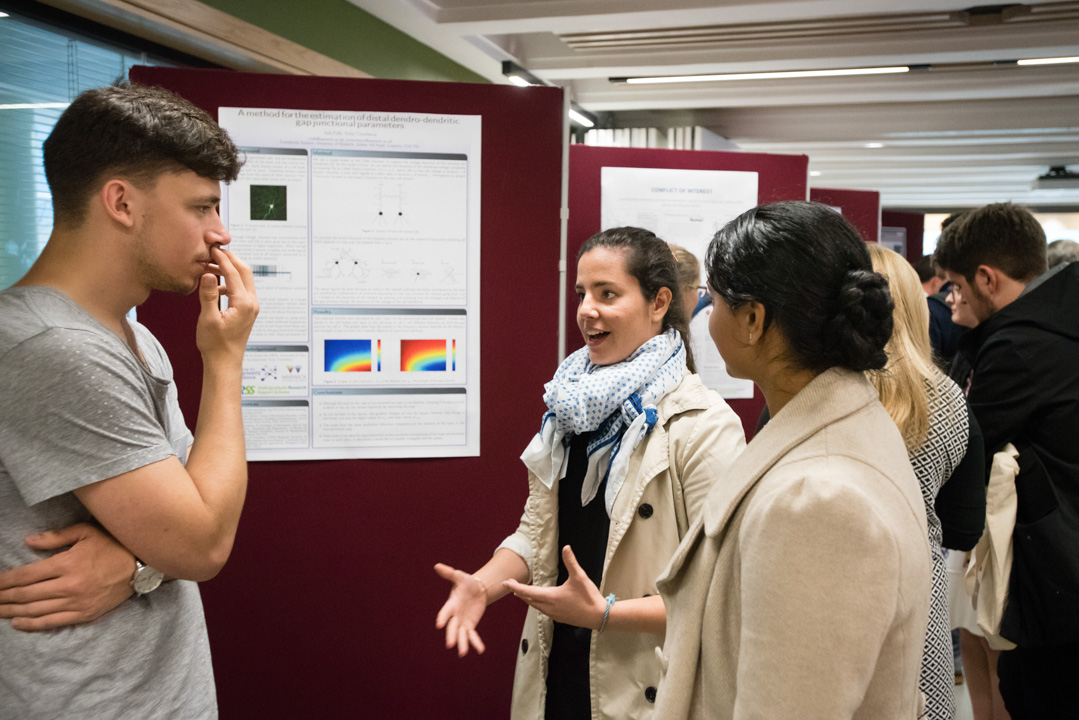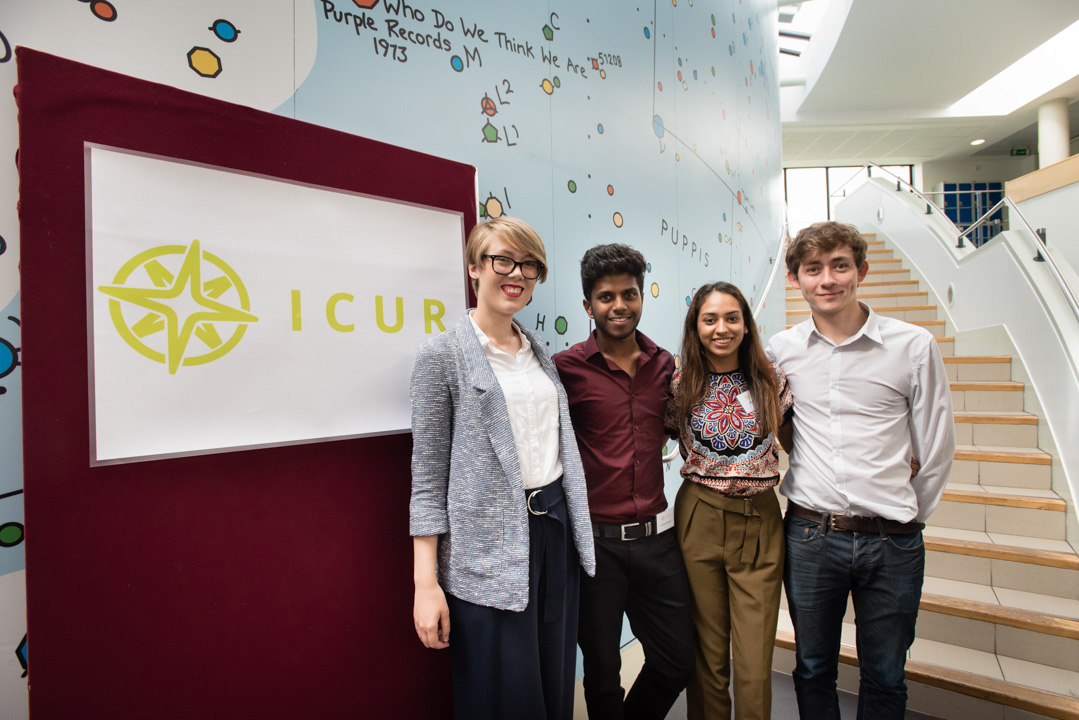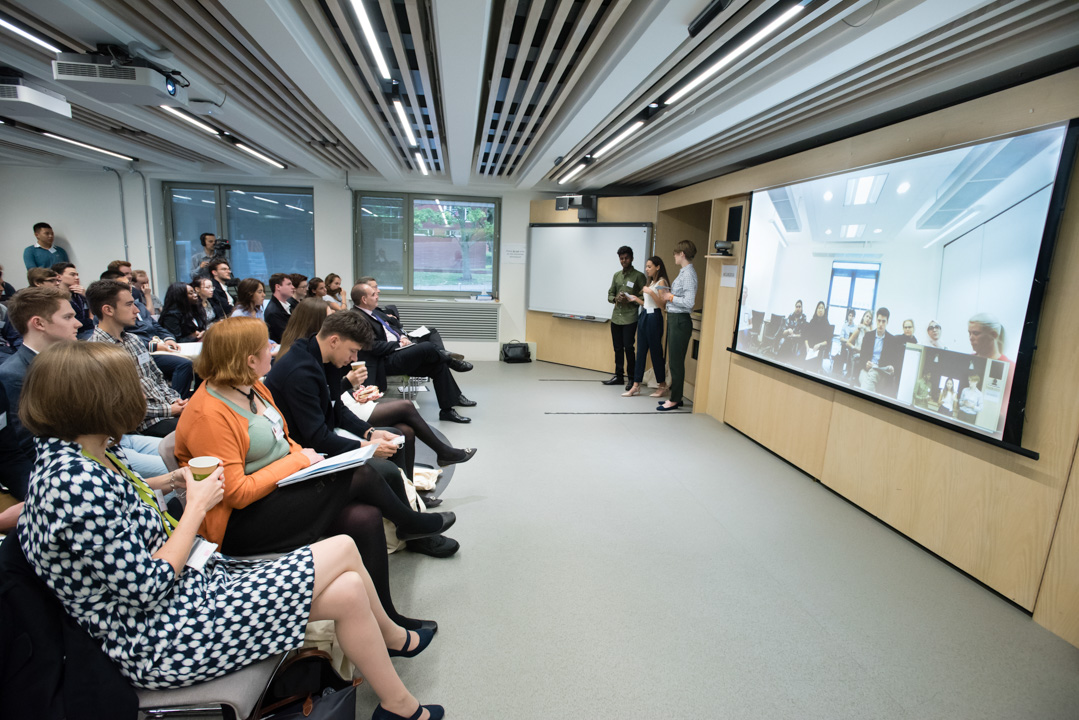Case study: International Conference of Undergraduate Research (ICUR)
The International Conference of Undergraduate Research (ICUR) is an exciting event where research is shared on a global platform by undergraduates involved in a hugely diverse range of projects. Using the latest in high-definition video-conferencing technology, ICUR enables students from institutions in eight countries, across five continents to communicate with each other in real-time, without having to leave their home institution. Undergraduates present their research in joint sessions alongside peers on the other side of the world in a single 48-hour forum. ICUR also enables students who prefer to present their research in a different format, to do so through poster presentations, to local audiences and through our international poster sessions. Students are a vital part of the success of the event, holding key positions of responsibility in developing and organising the conference.
Department(s) / colleagues involved
Institute of Advanced Teaching and Learning (IATL), Monash-Warwick Alliance, Audio-Visual Services, CURIE at Monash
Our aim was to …
Ensure that our undergraduate students felt a part of the academic community, with a voice and the ability to contribute to the research discussions within the sector. We also wanted to give them a meaningful global experience without leaving their home campus. We wanted to encourage them to take the next step on their path to global citizenship, while keeping their carbon footprint low, side-stepping the often significant financial obstacle of travel and taking into account other mobility issues. We hoped that the conference would help students to look beyond their own experience to see the complexities and interconnectedness of the wider world, challenging them to examine their work from an international perspective and to draw out those aspects of potential impact globally. Through developing unifying research streams and encouraging students to focus their research and presentations on these themes we wanted students to learn from each other and to reflect on global issues.
We also wanted to introduce undergraduates, who had not yet undertaken research projects, to a conference environment and to the international perspectives of presenters and audience members in other participating institutions, through becoming volunteers or audience members at ICUR.
What we did …
We started small, with financial support from the Monash-Warwick Alliance. Staff from Warwick’s Institute for Advanced Teaching and Learning (IATL) worked in partnership with colleagues at Monash University, with whom we had an existing working relationship through our undergraduate research journal Reinvention, and our own Audio Visual team. We set up our first event, which ran for one day in May 2013, and included undergraduate presenters from the UK, Australia, South Africa and Malaysia. Following the success of the first conference, we built on that experience, developing a 5 year plan for the initiative, which was supported by the Monash-Warwick Alliance. Each year we forged relationships with new institutions across the world and developed support and training materials for participating students. We are now preparing for the 6th annual ICUR in September this year.

The outcome has been …
That as the popularity of ICUR has grown, staff in IATL, and our colleagues at Monash, have developed the programme to support the learning needs of student presenters. Today, we use the term the ‘ICUR Experience’, which covers a wealth of newly developed activities, including a wide range of research training activities that span 9 months of the year: workshops that are designed to impart crucial research conduct and communication skills, student-led research and mentoring networks, grant-writing training schemes, publication training and support, masterclasses with academics and industry – all these events, and others, orbit the conference, serving as rich educational preludes and epilogues.
The close working relationship between the ICUR teams at the core institutions of Warwick and Monash means that the operational systems that underpin the conference are developed and streamlined each year, which allows us opportunities for innovation. From the structure of our sessions with 30 minute joint Q&As, to the orchestration of the video-conferencing technology to best facilitate direct interaction between international audiences, to our new complementary programs like Compass, which organises and facilitates international student research training groups, ICUR is constantly evolving to respond to the needs of our students.
The benefit/impact has been …
That in the past five years, ICUR has given over 1300 students, from 15 institutions in Japan, Singapore, Malaysia, South Africa, the United States, Indonesia, Australia, and the United Kingdom the opportunity to present research on a global stage. Each year, the number of abstracts submitted, the number of institutions connected, as well as the number of student hosts, volunteers, and audience members at the conference continues to grow. From ICUR we have developed new initiatives, including the Compass mentoring programme and a joint Monash-Warwick module, as well as creating international relationships with institutions on 5 continents. ICUR’s impact has also been recognised in the Higher Education sector through the IIE’s Heiskell Awards, the Australian Financial Review Higher Education Awards, the Victorian International Education Awards and the Wharton-QS Stars Reimagine Education Awards.
This supports the Education Strategy by …
Engaging with and enhancing all 4 pillars of the Education Strategy: Disciplinary Excellence, Interdisciplinarity, Internationalisation and Student Research. At Warwick we have had presentations from students in 24 departments at ICUR, showcasing the best of undergraduate research in each discipline. Within the conference, those discipline focused presentations are themed into interdisciplinary panels, with panels in 2017 such as Questions of the Cosmos, Interdisciplinary Approaches to Health, Beliefs & Ideologies, The Intersection of Engineering and Biomedical Science and Immigration & the Nation. Such panels have led to exciting and interesting discussions, with presenters learning from each other and audience members enjoying different perspectives around a single theme. The internationalisation experience offered by ICUR includes more than the obvious benefit of students being able to connect with each other across the world. Training sessions ahead of the conference on intercultural communication equip students with the communication and delivery skills to present their research to an international audience. The Compass Programme gives students the opportunity to work in mentored international groups, giving the rare opportunity for undergraduates to discuss with and get feedback on their research and presentations, not just from Warwick peers but from peers across the world. As for student research, ICUR has given hundreds of Warwick students the opportunity to present their research on the world stage, but, more than that, we hope it has created a culture here that says that all students have something to contribute to the academic discussions within the sector.
The response of students / staff has been …
Brilliant! We conduct in-depth student feedback after the event that includes online surveys, face-to-face interviews, recordings of sessions available to students to view and reflect on their presentations, follow-up intercultural competencies seminars, and workshops on next steps for ICUR. We have received extensive feedback that presenting at the conference, from the point of submitting an abstract and having to consider how their research fits in to the ICUR Research Streams, to going through the abstract revision process, to presenting, to the international Q&A, the impact on the global and multidisciplinary outlook of individual students is significant and long-lasting. Another aspect of the impact of the conference that is frequently mentioned in our feedback surveys is the confidence building effect of taking part in the event, not only confidence in presentations skills and English-speaking skills, but developing confidence as researchers, frequently allowing students to undertake further research or to apply for continuing research-based study. Students also enjoy meeting and interacting with their peers from across Warwick, from different departments and disciplines, creating new academic friendships and experiencing new research perspectives. Staff at Warwick have been hugely supportive of the conference, particularly within IATL, the Monash-Warwick Alliance Office and Audio-Visual Services, without whom we couldn’t run the event. Staff also attend the conference, to support their students, to get involved in the Q&A sessions and to enjoy the wealth of new and engaging research being presented from across the world.
Our next steps will be …
Based around a number of key objectives and priority areas in the short to medium term.
We are very excited to be developing a ‘Virtual Conference Centre’. The Conference Centre is a conceptual space and we’re hoping that the virtual building terminology we use will help to demystify the complexity of hosting and attending a video conference event. Rather than giving delegates a set of very IT centric instructions, they can be presented with recognisable things; such as floor plans and room numbers. Links to online spaces can be delivered over the web with the user interface being in a recognisable website format. The Virtual Conference Centre should give even more students the opportunity to interact with the conference without even leaving the comfort of their home!
We need to develop formal operational processes and systems for the organisation of the conference and joint activities into the future, which will be vital for such a complex initiative. The creation of these management and scheduling systems will result in significant efficiencies of labour, a better experience overall for Monash and Warwick students, as well as a more professional package of options to present to members in the network.
We are also looking to consolidate and deepen the pedagogy and systems around existing ICUR Experience activities (Compass, Reinvention, ICUR, joint teaching activities) and want to further extend the experience we have of extra-curricular activities into the curriculum. We are keen to collect data and evidence to further evaluate all of our initiatives and to decide on our next area of development.
To find out more, you can contact …
Caroline Gibson, c.a.l.gibson@warwick.ac.uk
Emma Barker, e.barker@warwick.ac.uk
Other information about this case study


